Tuesday, May 21,2024. Annette’s News Roundup.
I think the Roundup makes people feel not so alone.
To read an article excerpted in this Roundup, click on its blue title. Each “blue” article is hyperlinked so you can read the whole article.
Please feel free to share.
Invite at least one other person to subscribe today! Here 👇 is the link to share for others to subscribe. https://buttondown.email/AnnettesNewsRoundup
Remember: when you share the Roundup, you are fighting Fascism and helping to bring about a Democratic victory in 2024.
_________________________________________________
Biden is always busy.
Atlanta.
https://x.com/bidenswins/status/1792330405091181031?s=61&t=I_Od53CbnPTsbLcD0baXPg
https://x.com/chrisdjackson/status/1792257804104769769?s=61&t=I_Od53CbnPTsbLcD0baXPg
https://x.com/chrisdjackson/status/1792375989646905528?s=61&t=I_Od53CbnPTsbLcD0baXPg
https://x.com/chrisdjackson/status/1792209433340334381?s=12
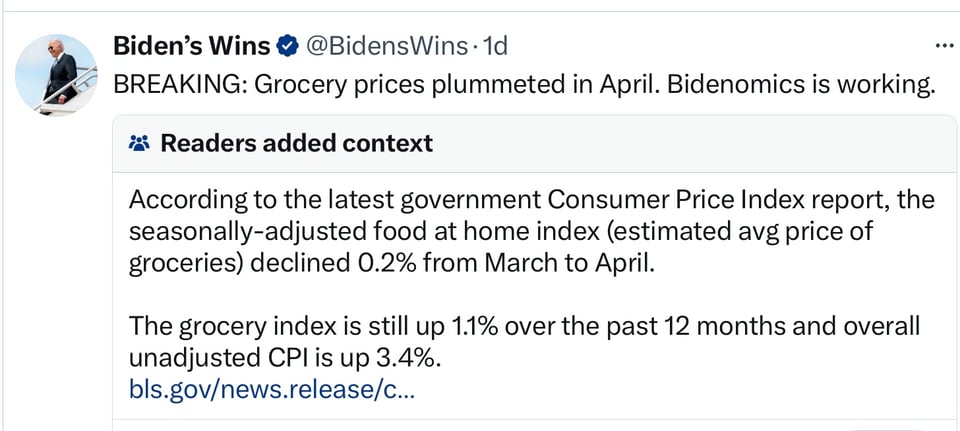
Here is the Morehouse speech. 👇 important speech.
This is what Simon Rosenberg said, “It was a powerful speech and an important moment in the Biden Presidency. Try to read or watch today.”
https://x.com/chrisfromga68/status/1792153264462368849?s=61&t=I_Od53CbnPTsbLcD0baXPg
Jamal Simmons is a CNN Commentator.
https://x.com/jamalsimmons/status/1792203880257945774?s=61&t=I_Od53CbnPTsbLcD0baXPg
_________________________________________________
Kamala is always busy.
Vice President Harris is a member of AKA, Alpha Kappa Alpha, one of the Divine 9. The Divine 9 or D9 are the nine Black Greek letter organizations with over 2 million members total, and comprise the National Black Panhellenic Council.
https://x.com/vp/status/1791821442415268168?s=12
_________________________________________________
Trump offenses of the day.
Saturday.
https://x.com/bidenhq/status/1791959749082157134?s=61&t=I_Od53CbnPTsbLcD0baXPg

https://x.com/juliahamelburg/status/1791832025327923519?s=61&t=I_Od53CbnPTsbLcD0baXPg
Perennial. Never forget.

SNL is witty but why cast a 30+ trim guy as Trump?
https://x.com/nbcsnl/status/1792041121343828015?s=61&t=I_Od53CbnPTsbLcD0baXPg
In Trump’s criminal trial in New York, final arguments will soon be made. The jury will then decide whether the 45th President is a felon.
As you try to determine the verdict, keep this in mind.👇
A Trump Conviction Doesn’t Hang on Michael Cohen.
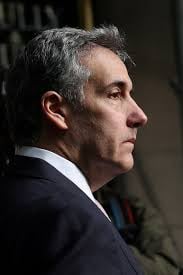
The Manhattan district attorney’s case against Donald Trump has unfolded like a north-of-the-border telenovela, with lurid tales of sex, spankings, hush money and silk pajamas, as well as the occasional detour into the editorial practices of supermarket tabloids. But the case, provocative as it has been, may turn on something a great deal more mundane than the testimony.
The key question the jurors will soon be considering is a straightforward one: Did the former president “cause” the creation of false business records? The prosecution has answered half of that question. There’s no reason to doubt the records were false. But the verdict is likely to turn on the other half — whether Mr. Trump caused the false information to appear on the invoices and vouchers. The evidence there is murkier.
According to the prosecution, on the eve of the 2016 election, Michael Cohen, Mr. Trump’s onetime lawyer and fixer, paid $130,000 to Stormy Daniels, the porn star, to guarantee her silence about a tryst she and Mr. Trump allegedly had a decade earlier. Mr. Trump then reimbursed Mr. Cohen for his outlay, plus a bonus and additional funds for taxes. The business records of those payments to Mr. Cohen called each one a retainer for legal services, rather than what they were: a reimbursement for the hush money paid to Ms. Daniels.
The prosecution has done an excellent job of proving these details. Was the information on the documents false? Absolutely. Several witnesses support the government’s claim that Mr. Trump’s payments to the lawyer were not legal fees. Mr. Trump himself tweeted in 2018 that Mr. Cohen received a “reimbursement” and said as much in a White House financial disclosure form.
The government also introduced a document in the handwriting of Allen Weisselberg, the former chief financial officer of the Trump Organization, detailing the reimbursement scheme. Mr. Cohen laid out his own money — $130,000 to Ms. Daniels and about $50,000 in another expense. Mr. Weisselberg jotted that the reimbursement would break down as $180,000 in income to Mr. Cohen, $180,000 to cover Mr. Cohen’s taxes, and a $60,000 bonus. The total of $420,000 was exactly what Mr. Cohen received in 11 checks. The prosecution also made a strong showing that the payoff to Ms. Daniels was designed, above all, to help Mr. Trump win the 2016 election. That’s especially important in this case because if the jury finds that Mr. Trump was motivated to violate election laws, that elevates his crime from a misdemeanor to a felony.
Mr. Trump’s defense team barely disputed this evidence. At times his lawyers seemed to be trying harder to please their client than to win their case. In cross-examining Ms. Daniels, Susan Necheles did a fine job of showing Ms. Daniels’s anger at Mr. Trump and her financial interest in a conviction in this case. But then Ms. Necheles began a long and unpersuasive attempt to show that Ms. Daniels was lying about the underlying sexual encounter. Ms. Daniels’s story of that night was solid, including such details as her whacking Mr. Trump with a magazine when he condescended to her and his louche outfit when she arrived at his hotel room. “Does Hugh Hefner know you stole his pajamas?” she recalled asking Mr. Trump. (Mr. Trump denies having an affair with Ms. Daniels.)
Given the structure of the case, it almost doesn’t matter whether the two had sex in 2006, which made the defense assault on Ms. Daniels even more unnecessary. All that the jurors needed to know was that her story, true or not, represented a threat to Mr. Trump’s 2016 campaign, and that’s why he wanted to pay to shut her up.
The prosecution went to a great deal of effort to prove that Mr. Trump, notwithstanding his great wealth, was a tightwad who kept a close eye on every expenditure. The jury heard quotes from Mr. Trump’s own book recounting how he personally signed his own checks. In an email, an assistant brought up the purchase of something as minor as a picture frame for “about $650 minus %15 discount. Does DJT want to spend that much?”
This testimony was aimed at shoring up the principal weakness in the government’s case. The defense has argued that while Mr. Trump signed the checks to Mr. Cohen, there was no direct evidence that he knew about how those payments were recorded by the bookkeepers at the Trump Organization. He had no reason to check how the payments were categorized.
This is where Mr. Cohen’s testimony was vital. The three days he spent on the stand so far resembled a prose opera of love, betrayal and revenge. Mr. Cohen said that Mr. Trump knew about a plan to lie about the payments and described how he prepared invoices that falsely characterized the payments as legal fees, even though both men knew that the payments were reimbursements. If the jury believes Mr. Cohen, despite a brutal cross-examination that underlined his history of lying, then conviction is almost assured.
But even if the jury writes off Mr. Cohen or discounts his testimony, the government can still prove its case. Under the law, Mr. Trump can be convicted if he “caused” the false records to be created. The jury has to believe that Mr. Trump knew any documents characterizing the payments as legal fees were false.
The government has argued that Mr. Trump couldn’t have missed at least some of the false statements, because the word “Retainer” was on the stubs attached to the checks he signed. That’s a persuasive argument because someone as penurious as Mr. Trump surely would not spend $420,000 without knowing the reason, and thus he had to know that records describing those expenditures another way were false.
Juries surprise — sometimes. This one, especially with two lawyers on it, is likely to be fastidious about examining the evidence and following the law. Despite the sensational surrounding drama, the issue for these 12 Manhattanites is likely to come down to the prosaic business of invoices and vouchers, and how they came to tell a story that was different from the one that actually happened. (Jeffrey Toobin, New York Times).
_________________________________________________
Governor Glenn Youngkin of VA is no moderate.
On Friday the Roundup carried the news that Youngkin had vetoed a bill that would have protected access to contraception. Now we can see what other damages he did. 👇
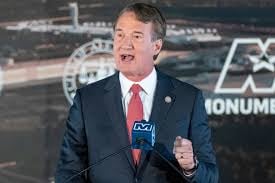
Gov. Glenn Youngkin took action Friday on the last remaining legislation from the recent session, signing seven bills and vetoing 48, including high-profile measures related to birth control, skill games and tax exemptions for organizations with Confederate ties.
“While I look forward to working with the General Assembly to see if we can reach agreement on language in the future, today I must act on the language before me, and there are several bills which are not ready to become law,” Youngkin said in a statement.
Del. Cia Price and Sen. Ghazala Hashmi, D-Richmond, carried the birth control bill in their respective chambers.
“This is such a popular issue,” said Price, D-Newport News. “It was the one thing that I was holding out hope for, but the governor has his allegiances to the most extreme part of his party.”
The measure stated that health care providers have the right to prescribe contraceptives, and individuals have the right to obtain and use them. It did not pertain to abortion and defined contraceptives as any drug or device legally marketed and intended for use in the “prevention of pregnancy.” It created a right to file a lawsuit over violations and did not have a fiscal impact on the state.
Youngkin’s office announced the moves just hours ahead of an 11:59 p.m. deadline Friday and just days after Democrats who control the General Assembly passed a state budget compromise that the governor helped hammer out and immediately signed into law. The bipartisan spirit that helped the state avert a budget crisis in Monday’s special session seemed to evaporate with the latest vetoes, many of them related to culture-war issues that could play into this fall’s presidential and congressional contests.
“By vetoing our legislation, Governor Youngkin is now on the record agreeing with the extremists in his party — including Donald Trump — who conflate contraception with abortion,” state Sen. Ghazala F. Hashmi (D-Chesterfield) and Del. Marcia S. “Cia” Price (D-Newport News) said in a written statement about a pair of identical bills they sponsored that would have put a right to obtain and use contraception into Virginia law.
Youngkin had proposed changing the bills — HB609 and SB237 — to simply express the sentiment of the legislature that people have access to contraception under federal law. Hashmi and Price have said those amendments would have gutted the bills, rendering them meaningless if federal law changed. Letting his amendments die without a vote in April, the House and Senate sent the bills back to the governor in their original form, forcing him to choose between signing or vetoing them.
“Let me be crystal clear: I support access to contraception,” Youngkin’s written statement said. “However, we cannot trample on the religious freedoms of Virginians.” Separately in his veto statement, Youngkin said the legislation failed to include “adequate conscience clause protections for providers and also undermines the fundamental right of parents to make decisions concerning their children’s upbringing and care.”
Other bills vetoed by Youngkin include: Tax loopholes and license plates for Confederate groups Youngkin vetoed a pair of identical bills — HB568 and SB517 — that would have eliminated state tax loopholes for the United Daughters of the Confederacy, the Confederate Memorial Literary Society and the Stonewall Jackson Memorial Inc.
The groups are exempt from state recordation taxes and real and personal property taxes, an issue brought to the General Assembly by a Virginia Beach high school student after her lawyer father discovered the loophole in an obscure part of state law.
Youngkin had sought to duck the issue with an amendment requiring that the bills be voted on again next year and calling for a study. After the legislature rejected that, he pulled out his veto pen.
“Narrowly targeting specific organizations to gain or lose such tax exemptions sets an inappropriate precedent,” he wrote in his veto statement. “Choosing winners and losers is imprudent and undermines the tax system’s fairness. ” Youngkin also vetoed a bill — HB812, sponsored by Del. Candi Mundon King (D-Prince William) — that would have banned the further issuance of state license plates commemorating the Sons of Confederate Veterans or Gen. Robert E. Lee.
In his veto statement, Youngkin noted that the state offers so many specialty plates — including those advocating both sides of some hotly contested issues — that they cannot be construed as “endorsements by the Commonwealth.”
“The Department also offers specialty plates for debated social issues, such as advocacy for fox hunting, coal, or internet infrastructure,” he wrote. “In some instances, the plates represent overtly political statements, including pro-abortion, pro-life, for and against the Second Amendment, and even international relations concerning Tibet.”
Firearms
Youngkin vetoed identical bills, HB498 and SB225, requiring school boards around the state to notify parents every year of their responsibility to safely store firearms in the home. The measure was meant to reduce the risk of school shootings like the one that took place in Newport News in January 2023, when a 6-year-old boy shot and wounded his elementary school teacher with a gun he took from his mother’s purse.
“This proposed legislation is unnecessary for responsible parents and ineffective in persuading the irresponsible,” Youngkin wrote.
Youngkin, who won the executive mansion on a theme of parental rights in K-12 education, said the bills had “a singular focus on one parental responsibility, which applies to a subset of parents, omitting other legal obligations, like providing an environment free of abuse, neglect, and exploitation.
“ Youngkin vetoed a pair of bills — HB861 and SB515 — that would have banned firearms from hospitals providing psychiatric services. Youngkin’s veto message said hospitals already have the authority to ban guns from their premises, allowing them to have violators charged with trespassing. Youngkin also vetoed a pair of identical bills — HB173 and SB100 — to prohibit the sale or possession of “ghost guns,” weapons that have no serial number and are often made of plastic or other parts that can pass through metal detectors.
Youngkin’s veto statement said the measure might affect sellers of industrial parts, such as aluminum, that become part of those guns.
Skill games Youngkin vetoed a bill — SB212, brought by Sen. Aaron R. Rouse (D-Virginia Beach) — that would have legalized slots-like gaming machines in neighborhood stores and restaurants across the state. The measure was one of the hardest-fought of the session, with supporters calling the “skill games” a lifeline for mom-and-pop convenience stores and critics warning about an expansion of gambling too dispersed for meaningful state oversight.
Youngkin had proposed a wholesale rewrite of the bill, subjecting it to more stringent regulation and prohibiting the games within a 35-mile radius of casinos and other gambling venues or about a half-mile from any K-12 school, day-care center or house of worship.
Youngkin and legislators have indicated a willingness to continue working on the issue, which still has a chance to be revived. Since Monday’s special session was recessed rather than adjourned, lawmakers have the option to reconvene to take up a new skill games bill. (The Washington Post).
_________________________________________________
Wondering where to put your volunteer time and money?
Here are some worthwhile possibilities. So far five states - Florida, Maryland, New York, Colorado and South Dakota - will put the future of abortion rights directly before voters in the 2024 election. Arkansas, Arizona, Nevada, Nebraska, Missouri, and Montana may join these states for 11 states in total.
Those who turn out to vote for abortion rights will surely help the President and down ballot voters.
Senator Marco Rubio of Florida joins the dead.
Watch him. 👇
https://x.com/atrupar/status/1792198075546566703?s=61&t=I_Od53CbnPTsbLcD0baXPg
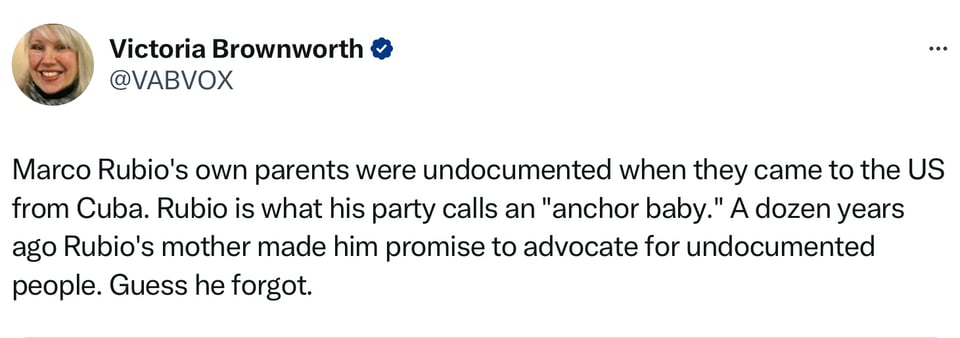
_________________________________________________
Abortion rights amendments qualify for the ballot in Colorado and South Dakota.
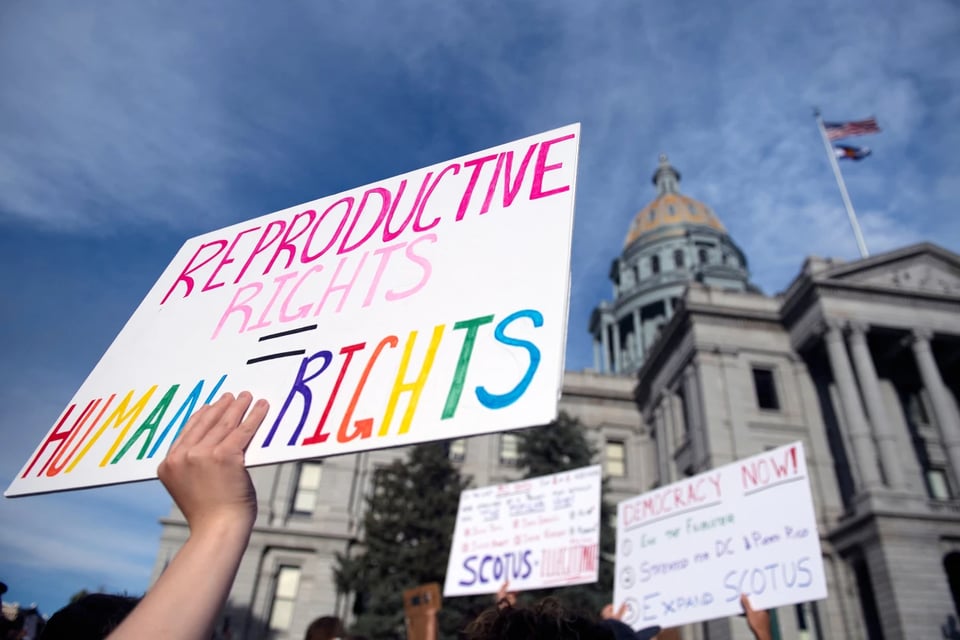
Officials in Colorado and South Dakota have certified proposed amendments that would enshrine abortion access in their states' constitutions to appear on the November ballot.
South Dakota Secretary of State Monae Johnson, a Republican, said in a statement late Thursday that her office had validated the petition for the ballot measure, finding that organizers behind the effort had filed more than the required number of signatures for it to qualify.
The ballot measure's placement can still be challenged before June 17.
And in Colorado, Democratic Secretary of State Jena Griswold's office issued a notice Friday that will also clear the way for an amendment that would formally enshrine access to abortion in Colorado’s constitution to appear on the ballot this year.
Constitutional amendments to enshrine abortion rights will now appear on the general election ballot in five states, including Florida, Maryland, and New York. Organizers in another six states are attempting to do the same.
Abortion rights measures could be on the ballot in 11 states this fall
Colorado, Florida, Maryland, New York and South Dakota will have ballot measures to protect or expand abortion rights, and efforts are underway in six more states. (NBCNews).
WORRY LESS. DO MORE.
_________________________________________________